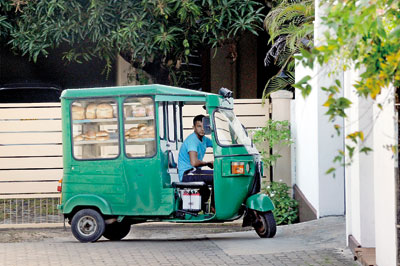News
Tinny tunes of mobile bakeries won’t be turned down soon
 Modified “choon paan’’ three-wheelers conveying “kimbula banis’’ and “seeni sambal’’ buns that weave in and out of by-lanes in the quiet hours of the morning and during languid afternoons playing a tinny tune continuously on a loop are not a welcome sight for everyone. While some rush out to meet the call of the mobile bakery, others scream for some peace and quiet.
Modified “choon paan’’ three-wheelers conveying “kimbula banis’’ and “seeni sambal’’ buns that weave in and out of by-lanes in the quiet hours of the morning and during languid afternoons playing a tinny tune continuously on a loop are not a welcome sight for everyone. While some rush out to meet the call of the mobile bakery, others scream for some peace and quiet.
Some insist that it is a “nuisance’’ that must be stopped, although there is no specific laws that could make them turn off their “irritable’’ tunes. But those tunes are their marketing jingles, just like on our loud TVs.
Police say the mobile bakery operators are making a living. Noise pollution regulators are handicapped. At the same time, how loud is loud, is subjective.
NGOs say they do get complaints as do physicians.
The Executive Director of the Centre for Environmental Justice, Hemantha Withanage, suggests turning down the decibels by using low-wattage sound equipment.
Decibels measure sound pressure waves.
Environment lawyer, Jagath Gunawardana, said that any amplifier or loudspeaker fitted on a vehicle must be approved by the police.
“The Motor Traffic Department should introduce regulations on loudspeakers and amplifiers on vehicles that cause a public nuisance,” he said. Such noise could be restricted to a specific time.
Over the years, people have complained to the police, Central Environmental Authority, local councils and the Motor Traffic Department, but they are unmoved.
Most residents who live alongside roads are woken up by the musical horns and the music of mobile bakeries that take to the streets as early as 5.00 a.m. in some areas.
“We are woken up by three-wheelers or motorcycles selling bread or other products. Some times one follows the other,” says Mangala Priyashantha, a resident of Kotahena.
The chairman of the All Ceylon Bakery Owners Association N.K.Jayawardena, said many mobile bakeries are not a part of the group and are run privately. Of the 1,000 members, only a few operate mobile bakeries, he claimed.
Doctors say they have heard complaints.
The consultant ENT surgeon of the National Hospital Dr. Chandra Jayasuriya said: “The noise from mobile bakery product distributors is subjective. This affects people who do not like being exposed to a lot of noise and people who don’t buy from mobile bakeries does not wish to tolerate the noise. However, noise pollution can cause psychological problems and migraine.”
She said, however, that mobile bakeries are constantly on the move and not harmful. On the other hand,
Dr Jayasuriya notes that noise from horns “has caused a lot of health complications, including migraine and a condition called ‘tinnitus’, which is the perception of noise, or ringing in the ears.’’
The exposure, duration and intensity of the noise, are factors that increase the potential of more harm.
Meanwhile, the new gazette notification on regulating three-wheelers too, has not addressed the issue.
The Motor Traffic Department admits there are no specific laws against mobile bakeries.
The Deputy Inspector General of Traffic, Palitha Fernando, said that although any kind of loud music from a vehicle is considered illegal, tunes from the mobile bakeries are allowed on the grounds that they do it for a living.
“It is not that we can’t take action against them,’’ he said, adding they are allowed to continue because the tunes they play alerts the public to their presence in the area.
The assistant commissioner, technical of the Motor Traffic Department, J.A.S. Jayaweera, also admits the music played by mobile bakery product distributors signals their arrival to the public.
Mr Jayaweera, said that because these bakers are involved in earning their daily bread, they are not being curtailed.
The former deputy inspector general of traffic, Amarasiri Senarathne, said that although there is a law against vehicles causing nuisance to the public with loud music, there is no law against mobile bakeries.
“It is not only mobile bakery product distributors, but sometimes even the garbage tractors also use sounds to alert the public,’’ he said.
| 45-50 Decibel noise limit in most areas Noise levels are regulated within diverse geographical boundaries in existing laws. Low noise area (within any Pradeshiya Sabha area) during the day time, noise level is limited to 55 decibels. And from 6:00pm to 6:00am the limit is 45 decibels. In a medium noise area (within any Municipal Council or Urban Council area) the day time noise level is limited to 63 decibels and 50 decibels at night. In a high noise area (any export processing zone established by the Board of Investment or industrial estates approved under Part IV of the National Environmental Act) 70 decibels of noise is allowed in the day time, at night time, the noise is limited to 60 decibels. In a silent zone (the area covered by a distance of 100 metres from the boundary of a courthouse, hospital, public library, school, zoo, sacred areas and areas set apart for recreation or environmental purposes) 50 decibels is the limit during day time, while 45 decibels is the maximum at night. |

